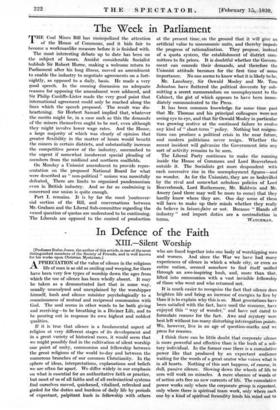The Week in Parliament
THE Coal Mines Bill has monopolized the attention of the House of Commons, and it bids fair to become a workmanlike measure before it is finished with.
The most interesting debate up to date has been on the subject of hours. Amidst considerable Socialist hubbub • Sir Robert Horne, making a welcome return to Parliament after his long illness, moved an amendment to enable the industry to negotiate agreements on a fort- nightly, as opposed to a daily, basis. He made a very good speech. In the ensuing discussion no adequate reasons for opposing the amendment were adduced, and Sir Philip Cunliffe-Lister made the very good point that international agreement could only be reached along the lines which the speech proposed. The result was dis- heartening. Sir Herbert Samuel implied that, whatever the merits might be, in a case such as this the demands of the miners themselves ought to be met, even although they might involve lower wage rates. And the House, a large majority of which was clearly of opinion that greater flexibility in the matter of hours would benefit the miners in certain districts, and substantially increase the competitive power of the industry, succumbed to the urgent if somewhat incoherent special pleading of members from the midland and northern coalfields.
On Monday a Unionist amendment to provide repre- sentation on the proposed National Board for what were described as " non-political " unions was mercifully defeated. There are limits to organized pandemonium even in British industry. And so far as coalmining is concerned one union is quite enough.
Part I. remains. It is by far the most :controver.: sial section of the Bill, and conversations between Mr. Graham and the Liberal Sub-committee regarding the vexed question of quotas are understood to be continuing. The Liberals are opposed to the control of production at the present time, on the ground that it will give an artificial value to uneconomic units, and thereby impede the progress of rationalization. They propose, instead of a quota system, the establishment of district com- mittees to fix prices. It is doubtful whether the Govern- ment can concede their demands, and therefore the Unionist attitude becomes for the first, time of some importance. No one seems to know what it is likely to be.
Mr. Lansbury, Sir Oswald Mosley and Mr. Tom Johnston have fluttered the political dovecote by sub- mitting a secret memorandum on unemployment to the Cabinet, the gist of which appears to have been imme- diately communicated to the Press.
It has been common knowledge for some time past that Mr. Thomas and his principal colleagues were not seeing eye to eye, and that Sir Oswald Mosley in particular was growing restive at the continued failure to evolve any kind of " short-term " policy. Nothing but resigna- tions can produce a political crisis in the near future, and modern politicians never resign. Whether the recent incident will galvanize the Government into any sort of activity remains to be seen.
The Liberal Party continues to make the running inside the House of Commons and Lord Beaverbrook outside it. The Socialists get more despondent with each successive rise in the unemployment figures—and no wonder. As for the Unionists, they are so bedevilled by the rival and somewhat nebulous policies of Lord Beaverbrook, Lord Rothermere, Mr. Baldwin and -Mr. Amery (and there may well be more to come) that they hardly know where they are. One day some of them will have to make up their minds whether they really do believe in laissez-faire or not. Because " Hands off industry " and import duties are a contradiction in










































 Previous page
Previous page